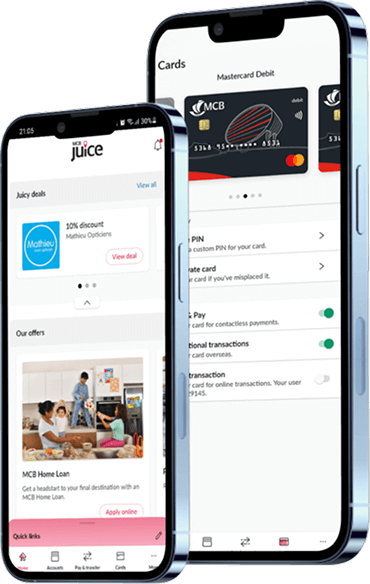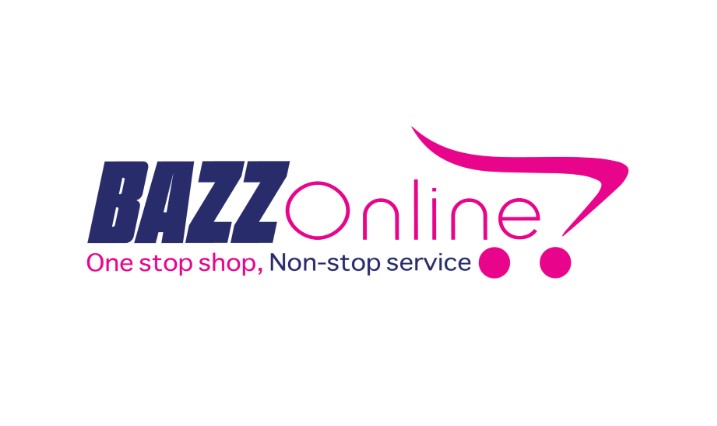Mobile Banking made easy

All your business finances, one app

Loans
We support key life goals, with flexibility and guidance at every step.
From vision to reality
Invest in your future
Your dream home at 5.05%
Why you should consider a proxy rather than a joint account
Opening a joint bank account can be a great way to manage shared expenses, but it’s important to understand both the benefits and potential drawbacks. Whether you’re considering opening a joint account with your spouse, family member, or trusted friend, knowing how these accounts work will help you make an informed decision.
In this guide, we’ll explore the pros and cons of joint bank accounts, alternative options such as MCB’s proxy banking solutions, and how to choose the right approach for your needs.
📝 What is a joint bank account?
A joint bank account is a shared account where two or more individuals have equal access to deposit and withdraw money. This type of account is commonly used for:
✅ Couples managing shared household expenses
✅ Parents and children for financial oversight
✅ Business partners handling joint expenses
✅ Siblings or roommates covering rent and utilities together
💡 Pro Tip: While joint accounts offer convenience, they also require a high level of trust, as all account holders have equal rights to access the funds.
💰 Pros of a joint bank account
✅ Easier Expense Management: Helps manage shared bills, rent, and groceries efficiently.
✅ Transparency: All account holders can track transactions, promoting financial accountability.
✅ Simplified Financial Planning: Easier for couples and families to save toward common financial goals.
✅ Immediate Access to Funds: If one account holder is unavailable, the other can still manage payments.
📌 Example: A couple saving for a house deposit can both contribute to a joint account, ensuring equal responsibility and tracking toward their goal.
💡 Pro Tip: Set spending rules and guidelines before opening a joint account to prevent conflicts.
⚠️ Cons of a joint bank account
❌ Loss of Individual Control: All account holders have equal access, meaning one person could withdraw all funds.
❌ Complications in Case of Disagreements: Disputes over spending can arise if expectations are not clearly set.
❌ Potential Legal Issues: If one account holder incurs debt, creditors may be able to access joint funds.
❌ Limited Privacy: All account holders can see transactions, which may not be ideal for those who prefer financial independence.
❌ Removing an account holder: In the event of the death of one holder or if one wishes to be removed, the joint account must be closed and a new account opened.
📌 Example: If a joint account is opened between business partners and one partner mismanages funds, both parties may be held liable.
💡 Pro Tip: Consider alternative account structures for better control and protection.
🔄 Alternative options - Proxy banking & separate accounts
If a full joint account doesn’t seem ideal, MCB offers alternative solutions:
🔹 Proxy Banking: Allows one individual to manage transactions on behalf of another without giving them full ownership of the account.
🔹 Separate Accounts with Shared Access: Instead of a joint account, each person can maintain their own account while setting up scheduled transfers for shared expenses.
🔹 Authorized Signatory Accounts: One account holder retains ownership, while others are given controlled access based on agreed permissions.
🔹 Removing proxy: Unlike a joint account, a proxy can be amended or revoked at any time without the need to close the account.
📌 Example: A parent who wants to support their child financially can use MCB’s Proxy Banking to allow limited access to funds without making it a fully joint account.
📌 Takeaways: Is a joint bank account right for you?
✔ Ideal for shared expenses but requires trust & financial discipline.
✔ Loss of individual control can be a major drawback.
✔ Consider alternative banking options like Proxy Banking for more flexibility.
✔ Set clear expectations and agreements before opening a joint account.
✔ MCB offers various account structures to suit different financial needs.
OFFERS & PROMOTIONS
Great deals, just for you
Explore our latest offers and promotions designed to give you more value, more often. From limited-time discounts to exclusive perks, there's always something worth checking out.
STYLESHADES LTD
As From 5% Discount
STYLESHADES LTD
Enjoy 5% Discount !
STYLESHADES LTD
Enjoy 5% Discount !
Why you should consider a proxy rather than a joint account
Opening a joint bank account can be a great way to manage shared expenses, but it’s important to understand both the benefits and potential drawbacks. Whether you’re considering opening a joint account with your spouse, family member, or trusted friend, knowing how these accounts work will help you make an informed decision.
In this guide, we’ll explore the pros and cons of joint bank accounts, alternative options such as MCB’s proxy banking solutions, and how to choose the right approach for your needs.
📝 What is a joint bank account?
A joint bank account is a shared account where two or more individuals have equal access to deposit and withdraw money. This type of account is commonly used for:
✅ Couples managing shared household expenses
✅ Parents and children for financial oversight
✅ Business partners handling joint expenses
✅ Siblings or roommates covering rent and utilities together
💡 Pro Tip: While joint accounts offer convenience, they also require a high level of trust, as all account holders have equal rights to access the funds.
💰 Pros of a joint bank account
✅ Easier Expense Management: Helps manage shared bills, rent, and groceries efficiently.
✅ Transparency: All account holders can track transactions, promoting financial accountability.
✅ Simplified Financial Planning: Easier for couples and families to save toward common financial goals.
✅ Immediate Access to Funds: If one account holder is unavailable, the other can still manage payments.
📌 Example: A couple saving for a house deposit can both contribute to a joint account, ensuring equal responsibility and tracking toward their goal.
💡 Pro Tip: Set spending rules and guidelines before opening a joint account to prevent conflicts.
⚠️ Cons of a joint bank account
❌ Loss of Individual Control: All account holders have equal access, meaning one person could withdraw all funds.
❌ Complications in Case of Disagreements: Disputes over spending can arise if expectations are not clearly set.
❌ Potential Legal Issues: If one account holder incurs debt, creditors may be able to access joint funds.
❌ Limited Privacy: All account holders can see transactions, which may not be ideal for those who prefer financial independence.
❌ Removing an account holder: In the event of the death of one holder or if one wishes to be removed, the joint account must be closed and a new account opened.
📌 Example: If a joint account is opened between business partners and one partner mismanages funds, both parties may be held liable.
💡 Pro Tip: Consider alternative account structures for better control and protection.
🔄 Alternative options - Proxy banking & separate accounts
If a full joint account doesn’t seem ideal, MCB offers alternative solutions:
🔹 Proxy Banking: Allows one individual to manage transactions on behalf of another without giving them full ownership of the account.
🔹 Separate Accounts with Shared Access: Instead of a joint account, each person can maintain their own account while setting up scheduled transfers for shared expenses.
🔹 Authorized Signatory Accounts: One account holder retains ownership, while others are given controlled access based on agreed permissions.
🔹 Removing proxy: Unlike a joint account, a proxy can be amended or revoked at any time without the need to close the account.
📌 Example: A parent who wants to support their child financially can use MCB’s Proxy Banking to allow limited access to funds without making it a fully joint account.
📌 Takeaways: Is a joint bank account right for you?
✔ Ideal for shared expenses but requires trust & financial discipline.
✔ Loss of individual control can be a major drawback.
✔ Consider alternative banking options like Proxy Banking for more flexibility.
✔ Set clear expectations and agreements before opening a joint account.
✔ MCB offers various account structures to suit different financial needs.
Useful tools and resources
Local & International Transfer
Banking conditions & processes for local and international transfer to other banks.
Rates & Fees
Interest rates, fees and charges applied to personal and corporate banking
Help & Support
We have gathered the most popular questions to get you started




























